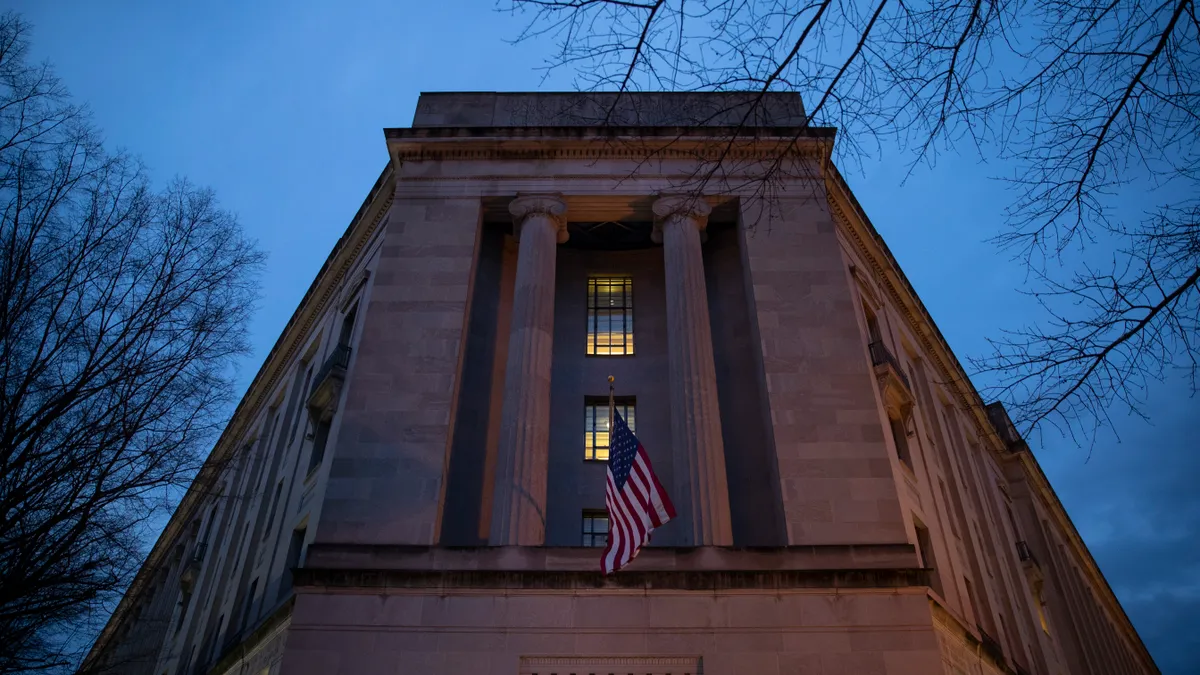Dive Brief:
- Stroudsburg, Pennsylvania-based ESSA Bank & Trust will pay more than $3 million to settle redlining allegations, the Justice Department announced Wednesday.
- The bank, between 2017 and 2021, “failed to provide mortgage lending services and did not serve the credit needs of majority-Black and Hispanic neighborhoods” in and around Philadelphia, the DOJ said in a complaint filed Wednesday in federal court.
- In a statement, ESSA President Gary Olson called the settlement a “constructive resolution to a dispute that has lasted several years.” Olson challenged the findings, however, saying ESSA “did not receive a single fair lending complaint from any customer or potential customer” in the years covered by the investigation. He added that ESSA opened a branch in a majority-nonwhite census tract in Allentown in 2018.
Dive Insight:
Wednesday’s settlement with ESSA marks the seventh redlining-related resolution the DOJ has reached since launching a coordinated effort in late 2021 to fight lending discrimination alongside the Consumer Financial Protection Bureau and the Office of the Comptroller of the Currency. The Federal Deposit Insurance Corp. brought the ESSA allegations to the DOJ in June 2022, and the department launched an investigation in August.
As part of the settlement, ESSA agreed to invest at least $2.92 million in a loan subsidy fund meant to increase access to credit for home mortgages, improvement and refinancing in majority-Black and Hispanic neighborhoods in the bank’s lending area.
At least half of that investment must be used for consumers applying for loans in majority-Black and Hispanic census tracts within a five-mile radius of the bank's Upper Darby and Lansdowne branches, according to a court order.
The bank also agreed to spend $125,000 on community partnerships and $250,000 on advertising, outreach, consumer financial education and credit counseling targeting majority-Black and Hispanic communities.
ESSA must also hire two new mortgage loan officers to serve its branches in West Philadelphia and conduct a research-based market study to help identify financial services needs in communities of color. The settlement’s requirements will remain in effect for five years.
“While vehemently denying the government’s allegations of redlining, we have cooperated expeditiously and fully with the investigation into this matter,” Olson said. “This settlement reflects our business decision to avoid the costs, uncertainties and distractions of litigation.”
The settlement “is consistent with our guiding principles and longstanding commitment to provide equal lending opportunities to all of the communities we are privileged to serve,” Olson added.
In a statement, Jacqueline C. Romero, the U.S. Attorney for the Eastern District of Pennsylvania, said the DOJ “appreciate[s] ESSA’s prompt cooperation … and their efforts that will aim to infuse lending resources and help build wealth” in majority-nonwhite neighborhoods.
“Redlining in Greater Philadelphia has deep roots,” Romero said. “It’s led to decades of disinvestment in communities of color.”
Indeed, in a DOJ settlement last year, Berkshire Hathaway subsidiary Trident Mortgage Co. agreed to invest more than $20 million to increase credit opportunities in neighborhoods of color to settle allegations the company engaged in lending discrimination through its marketing, sales and hiring actions in the Philadelphia area.
And racial disparity in mortgage lending — in Philadelphia, in particular — proved a sticking point for a community advocacy group during an August 2022 hearing on the now-terminated proposed merger between TD — which has its U.S. headquarters in the city’s metropolitan area — and First Horizon.
Rachel Labush, a supervising attorney at Community Legal Services of Philadelphia, cited a 2018 report by the nonprofit group Reveal indicating that TD, among large banks, was the most likely to deny a loan application from a Black or Latinx person.
“Unfortunately, since that reporting, TD Bank has not improved,” Labush said at the hearing.
The DOJ’s redlining initiative has collected $87 million in relief for communities of color. ESSA’s settlement ranks among the smallest. Los Angeles-based City National Bank agreed to pay $31 million in January to settle redlining allegations. New Jersey-based Lakeland Bank agreed to pay more than $13 million in September. Ohio-based Park National Bank agreed to a $9 million settlement with the DOJ in late February. And Mississippi-based Trustmark Bank agreed to pay $5 million in October 2021 in the multiagency anti-redlining effort’s first settlement.
“For too long, residents of communities of color have been unlawfully denied equal access to credit and shut out of economic opportunities,” DOJ Assistant Attorney General Kristen Clarke said Wednesday. “When banks engage in redlining, they perpetuate existing patterns of segregation and widen the racial wealth gap in our country. This resolution makes clear our commitment to holding banks and financial institutions accountable for modern-day redlining while ensuring access to fair lending in communities of color.”











